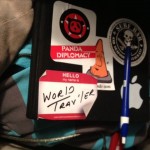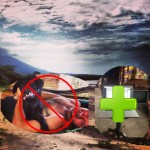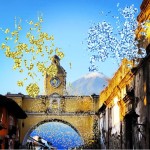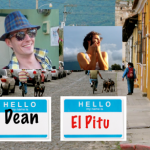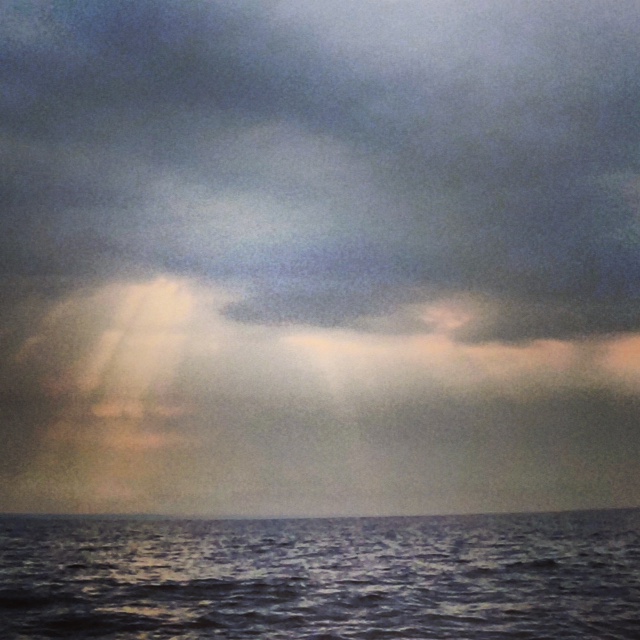
A quick search of my laptop shows that I possess seven unfinished drafts of articles about Monterrico, Guatemala. In one abandoned draft from 2008, I lead with, “Nothing by the sea ever lasts. Cars rust in record time. Sand is always in everything. You never get it fully out of your hair. Things rust away. Smart construction is cheap construction, since wayward weather can come and wash everything away.”
The nature of the ocean defies permanence. A wave is an exemplar of this transience—once experienced, it is gone. Like a crashing wave’s unfinished articulation, each abandoned draft gets near the expression of something about Monterrico that defies answering the question, “Why this stretch of beach dirty beach?” Why this coastal village of thatched roofs stretching a few kilometers along the coast? Why this fishing, chicken and pig-raising slow paced coastal town?”
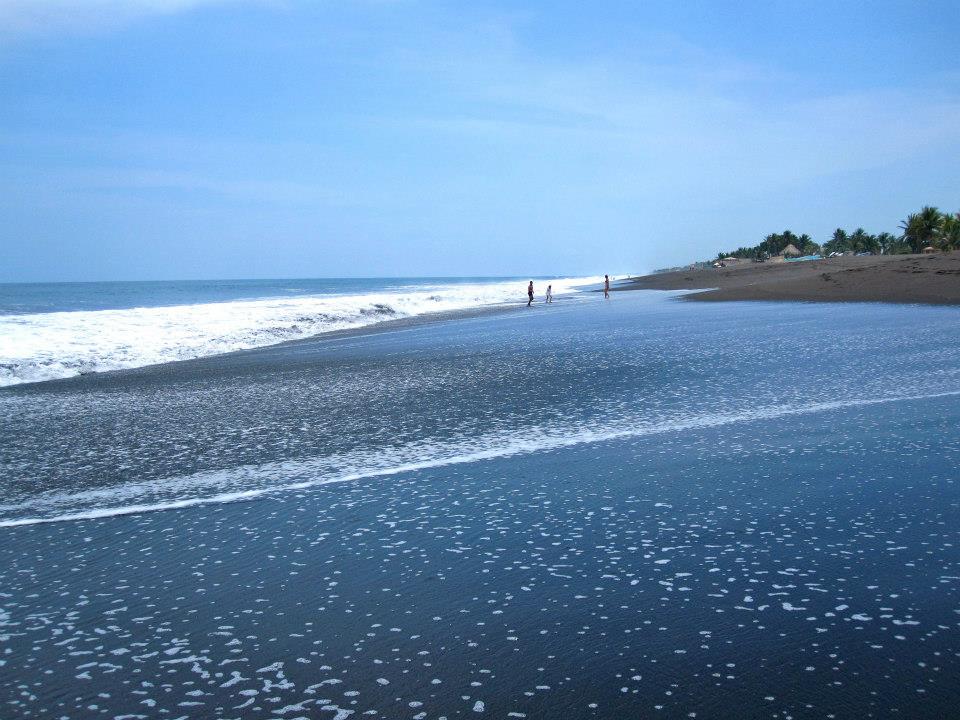
Stretch of Monterrico beach – Taken by amiga Amy Gridley
Monterrico is known for its black volcanic sand, and notorious for a break that crashes with sometimes-lethal fervor. There are better stretches of beaches in Guatemala, but this stretch is the one I find myself returning to like a moth to a flame.
I’ve put three showers between my most recent trip to Monterrico, but can still feel a few stray grains of black volcanic sand in my hair. This time I came with a visiting friend from high school, Matt. I watched his gaze as he discovered a new place that for me is memory strewn.
As we walked to check into our cabin the hotel Johnnies’ place, I pointed out small triangle pool in front of one of the hotel Johnnies. “Son,” I told Matt, “I have seen some of the most untamed debauchery ever experienced at a midnight erupting from that pool.”
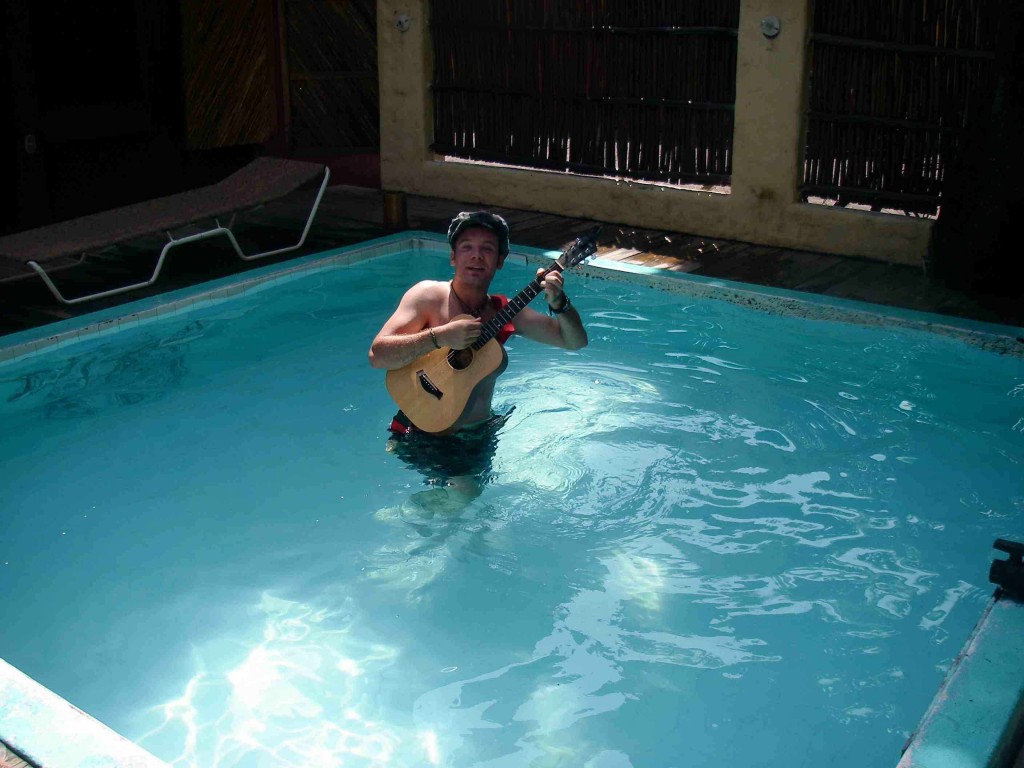
I don’t swim in Monterrico anymore, too many flirtations with death. I remember when skinny dipping in 2008 how I made so many promises as I fought in a washing machine of dark waves. Promises of things I’d do, what I’d no longer do—desperate to exchange these survival entreaties with more air.
I broke free into the air as a monstrous wave crashed and pushed me back down. This dark cycle repeated, how many times I don’t know—likely fewer than the eternity it seemed.
When a wave crashed and finally set me free, a naked body I barely recognized as mine collapsed on the sand. I lay on my back and looked up at stars that saw everything and did nothing. Naked, I walked back to the Johnnies. The bar was closed and one bartender on crutches was behind the bar—Elvin. Wanting to hide my nakedness, I snatched one of the tablecloths from the restaurant and wrapped it around my loins. Elvin told me this was unacceptable, and hobbled after me, but I ran out onto the path, back to my cabana. Nowadays when I come, we both exchange an abrazo and laugh about the night of naked gringo.
When I was working full-time in an NGO, I had a tradition of spending a night Monterrico alone before returning to the US for Christmas—it served as a reflective buffer between two worlds. December 2008 the tourist part of town was empty but for a few expatriates and local workers who I joined in a poker game. Then a volunteer, I had $12 to buy my eleven family members gifts. I decided to risk it at the poker table and ended up cleaning up. Santa Clause came bearing Guatemalan made gifts to the Armstrong family that year.
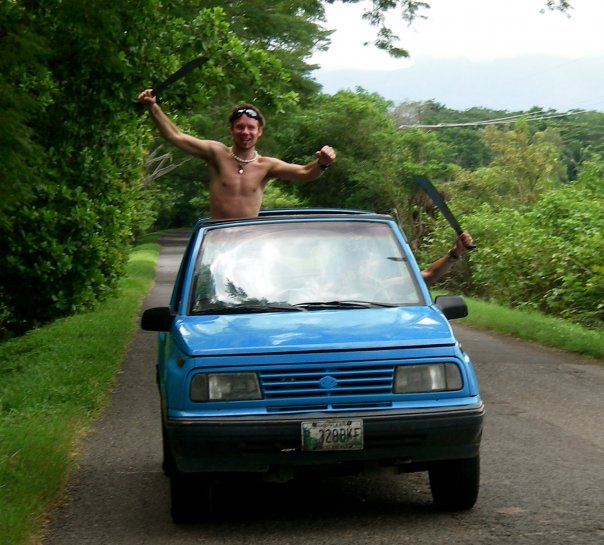
My first trip to Monterrico, I took with my roommate and colleague Charlie. We drove his 1996 Geotracker. When we drew close to the beach on banana tree flanked roads, we ripped off our shirts and raised our machetes like a roving gang of bandits—because that’s just what you do if you got em.
Later that night, at last call of a now-closed dance club, Charlie ordered six bottles of beer and slinked down next to me in the sand. We spent the next two hours drinking, looking at the stars, and had one of those what’s-the-meaning-of-life conversation, the night offering a hint at the close friendship coming around the bend.
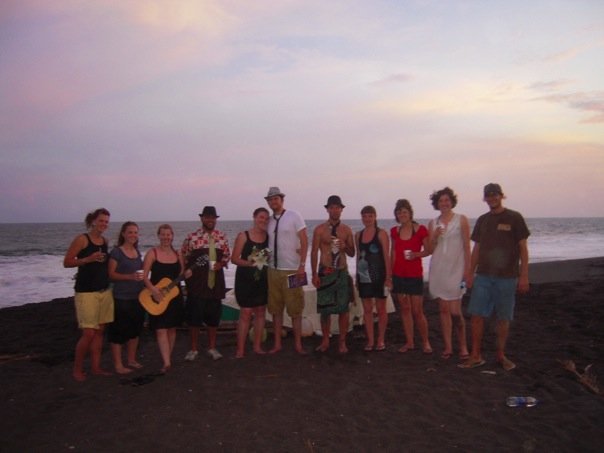
Photo Credit Brownyn Fleming-Jones
When friends from my Chilean exchange program came to visit Guatemala, we staged a mock wedding for my compadre Jordan and his fiancée Kate—complete with flowers stolen from the local church, magnanimous speeches, and watermelons filled with rum punch. The best man wore a sarong and tie. The preacher offended every major religion. We passed out invitations all over town and some of the village attended. The best man’s speech involved the Traditional Burying of Moisturizing Cream and a pornography DVD since in the bond of marriage a man no longer needs such utensils.
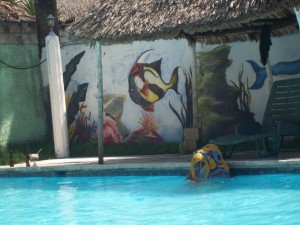
Photo credit: Baker
Remembrances of a past romance also dot this beach. One October night I lay on Monterrico’s still-warm night sand. A woman I’d begun kinda-sorta dating sat atop me. We kissed and I looked into her eyes, the brightest stars in a moonless night of stars. Behind her the Milky Way framed her face. I told her that night that no matter what happened between us as we advanced on this road of togetherness, that this was how I would remember her—smiling, tanned, in a yellow bikini—lovely.
That night led to love and togetherness that eventually yielded to loss and separation. Two years later when we parted ways, when parting from each other was a torture, the week after Christmas, both still so addicted to each other, we took a three-day trip to Monterrico—I guess to say goodbye. I am eternally grateful that we did this. Relationships and their breakups are filled with misunderstandings, which crash like killer waves of the mind. Over those three days together we talked openly and honestly about us, what we had been, how we had loved each other, and how somehow all that had fallen apart.
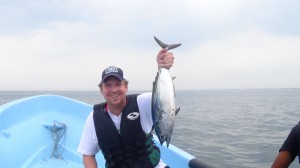 head out with some of the local fisherman. There is the thrill of our launching small lancha into oncoming waves from the shore.
head out with some of the local fisherman. There is the thrill of our launching small lancha into oncoming waves from the shore.
The beauty of watching the sunrise above the shore. The kick of Matt landing a tuna with ecstatic reeling. The thrill of my hooking a fish and the disappointment of it getting away. There is the adrenaline rush of gunning the boat over the waves to beach it like a whale. Then there is the lunch of fresh tuna, just from the sea.
There are places in the world where one always returns. Most of us have a stretch of beach or two we cannot seem to escape. A stretch of rhythmic surf turns all of us into philosophers, listening to waves, waiting for an answer to the questions they seem to ask.
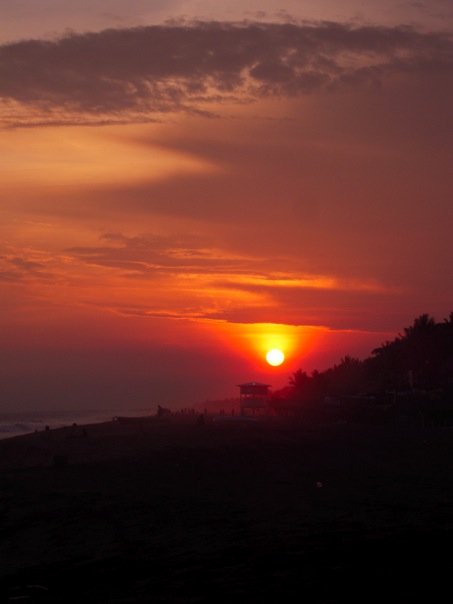
Monterrico Sunset. Credit Bronwyn Fleming-Jones
For me, Monterrico is like a landscape painting that becomes more expansive with each rendering. Nothing is ever painted over, people are never taken away. Every visit serves as a few more brush strokes that color the whole.
I remember each campfire I’ve sat around in Monterrico, but forgotten the songs our guitars sang on those nights. I remember elations, love, friendships and desolation on this stretch of beach—loving and lethal waves, all of which belong in some whole that I’ve spent six years nearly writing about. All that remains constant, is that I find myself continually returning and this is how to find permanence in something as fleeting as the crash of a wave.

